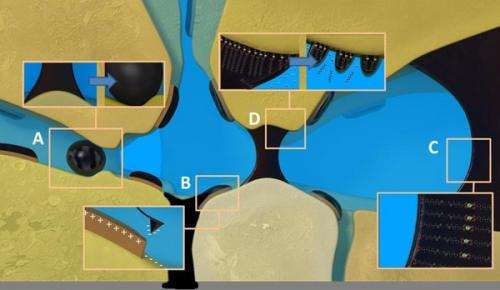Fundamental research improves oil extraction efficiency

We are currently successful in extracting approximately one third of the oil from oil fields. The reason for this low figure is that a large proportion of the oil remains trapped in the rock. It was already clear that great improvements in efficiency could be achieved by using water with a lower salt content when drilling. However, it was unclear which specific physical principles were behind this and what role salt ions played. Scientists from the MESA+ research institute of the University of Twente have now managed to unravel what these principles are. A better understanding of the process can lead to significant improvements in oil extraction efficiency. The research has been published in the Nature Publishing Group's open-access journal Scientific Reports.
A very large proportion of the oil in oil fields does not reach the surface, as it is not, or not yet, possible to extract it. The reason is that the oil is trapped in porous rock in the ground. Oil companies pump water into the ground in order to push the oil out through the pores, generally using salt water from the sea next to the oil platforms. It was already clear that, in order to achieve maximum results, the water used should not be too salty, but until recently the exact role of the salt ions in the process was unclear.
Fundamental physics
Researchers of the University of Twente therefore looked at the fundamental physics behind the influence of ions contained in the water used in oil extraction. In order to do this, they used ultra-high resolution measurements taken with an atomic force microscope, along with numerical simulations. The research, which has taken approximately five years, has shown, among other things, that the process is more complex than previously thought. Especially divalent ions, such as calcium, need to be removed from the water as they strengthen the attachment of the oil to the rock.
One more year of oil
According to Prof. Frieder Mugele, PhD, head of the Physics of Complex Fluids department, scientists will be able to make vast improvements to the efficiency of oil extraction techniques if they have greater insights into the fundamental principles of the physics involved. "For that reason, the scientific article in Scientific Reports is the crowning glory of approximately five years of research. Ideally, we would be able to determine the optimum ion composition for the water in each oil field, so that we could then achieve a maximum yield for each oil field. If we are successful in improving the efficiency of oil extraction by just one percent, the entire world population can be supplied with oil for one extra year."
More information: "Direct observation of ionic structure at solid-liquid interfaces: a deep look into the Stern Layer." Igor Siretanu, et al. Scientific Reports 4, Article number: 4956 DOI: 10.1038/srep04956. Received 06 January 2014 Accepted 22 April 2014 Published 22 May 2014
Journal information: Scientific Reports
Provided by University of Twente


















